- Home
- Puppy training
- Potty training your puppy
Potty Training Your Puppy: Simple Steps For Housetraining A Puppy
Potty training your puppy will be pretty high on your list of priorities right now. That's because, unfortunately, new puppies don't always arrive fully housetrained.
Don't worry; these invaluable tips and advice will help make potty training your puppy a breeze! Our ultimate guide to toilet training your Cocker Spaniel puppy will help you to have your little boy dry in no time at all!
Potty Training A Puppy Is A Priority
Talk about butter wouldn't melt...this gorgeous little puppy is adorable, isn't he?
But who would have thought that something so cute (and so tiny) could produce so much waste? They're little poop and pee machines at this age!
And that's why potty training your puppy will be your number one priority right now!
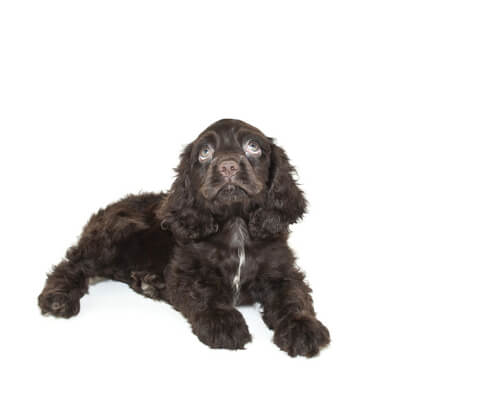 Potty training your puppy the easy way!
Potty training your puppy the easy way!Your puppy won't know any different at this young age, so it will be up to you to teach him your house rules.
Set up a simple puppy toilet training regime and stick to it - if you do, it will be much easier for you both!
Potty Training Your Puppy, Step By Step
No one ever said that house training a dog or a puppy would be a walk in the park, but if you follow the steps below, your Cocker Spaniel puppy will be dry in no time at all!
Right, let's get started.
Timing Is Everything When Potty Training Puppies!
How will you know when your puppy wants to pee?
The simple answer is you won't! However, where house training is concerned, timing is everything.
Your puppy's toilet needs are predictable. Understanding them will allow you to build a routine around those needs.
- As a bare minimum, your puppy should be taken outside every hour or so to allow him to pee outdoors.
- Take your puppy outside as soon as he wakes up, no matter how long he's slept.
- Ten minutes after your pup's had a drink, take him outside and encourage him to pee.
- Between 15 to 20 minutes after eating, your puppy may need to poop. It would help if you keep a close eye on him and take him outside 15 minutes after his last meal.
- Take him outdoors after any playing, exercising, or training sessions.
- If your puppy gets a fright or shock (a loud unexpected bang, for example), he may need to pee. Once again, take him outside - if it's not already too late!
- Let your pup into the garden after any stress or excitement. For example, when visitors call, when other dogs visit, or after some playtime.
Watch For The Tell-Tale Signs!
When potty training your puppy, it's important to watch him closely when he's out of his crate.
Don't give him the opportunity to pee or poop in the house. You could be setting him up to fail and it may cause a set-back in any progress you've made so far.
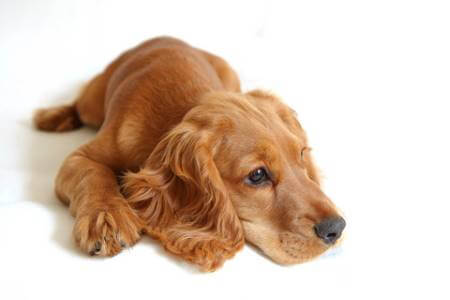 This cocker spaniel puppy is fully
housetrained!
This cocker spaniel puppy is fully
housetrained!When potty training your puppy, it's important to watch him closely while he's out of his crate.
I admit potty training your puppy isn't always easy, but if you watch him closely, you'll soon notice tell-tale signals that he's about to pee or poop!
These little nuggets of behaviour to watch out for are:
- intense sniffing of the floor,
- circling (turning in small tight circles),
- squatting,
- holding the tail high,
- crying or whimpering,
- going to the door or scratching at the door.
The minute you see any of these signs, scoop him up and take him straight outside to his toilet area.
When potty training your puppy, try not to leave him alone for longer than a few minutes.
You can almost guarantee that if you leave him any longer, he'll have an 'accident' while you're gone. You will return to find a little puddle (or parcel!) has suddenly appeared on your best rug!
Don't set your little boy up to fail.
If you allow your puppy to pee or poop in the house because you failed to catch him in the act, you'll be doing just that!
Setting your puppy up to fail will result in a setback to any progress you may have made.
As his internal 'plumbing' develops, he will be physically able to hold himself for longer. This will allow you to increase the time between your puppy's daily activities and the need to take him outside to pee.
Potty Training and Regular Feeding Times
When potty training your puppy, it's essential to feed him at regular times each day.
Regular input equals regular output - if you see what I mean.
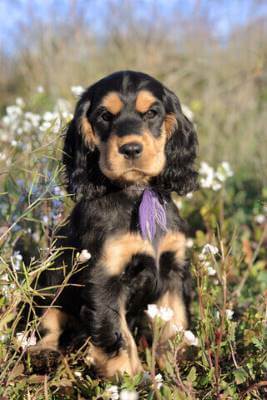 Oops, I just piddled! Just as well I'm outside.
Oops, I just piddled! Just as well I'm outside.Don't feed your puppy between meals, except for occasional small training treats.
If you overfeed your Cocker, he may need to poop more often.
The timing of his bowel movements and his need to pee will be unpredictable, too, making house-training your puppy much more difficult.
More to the point, overfeeding produces overweight dogs!
If you feed your new little boy regularly, he will soon begin to do his toilet to a regular pattern.
Choose His 'Potty Spot' Carefully
When potty training your puppy, it's best to teach him to do his toilet in the same place in your garden each time.
You won't need to play 'hunt the poop' in your garden! This makes for much easier collection and removal and keeping the area clean.
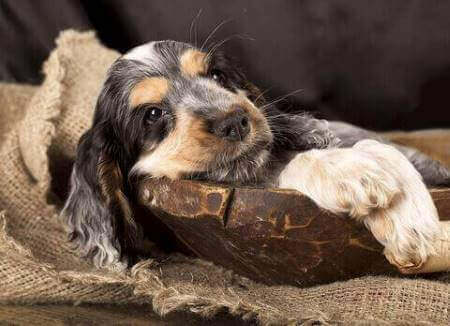 This potty training lark is easy - I've got it nailed!
This potty training lark is easy - I've got it nailed!Choose an area that you're happy for your Cocker Spaniel to use.
It should be far enough from the house, so there aren't any smells, but near enough for him to reach in time.
Before you begin puppy toilet training, put him on a lead, take him into the garden, and lead him to his particular toilet area.
Stay With Him Until He Pees
Don't leave your puppy alone outside when you take him out to do his toilet.
It's best if you stay with him; otherwise, he'll begin to play or explore and won't concentrate on the task in hand.
Don't be tempted to play with or fuss over him, either. If you do, he'll become more interested in you and/or playing than in doing the business.
Help your Cocker Spaniel puppy to concentrate on the job in hand!
Choose Your Words of Encouragement and Stick To Them!
Choose a word or phrase that you can use to encourage your puppy to perform. For example, "do toilet", "get busy", "go wee", or "do pee pee"; whatever works for you.
You'll be using these words in your local park many times, so I recommend you choose something you won't be too embarrassed to say out loud!
Once you've decided on your choice of words, ensure you and your family use them consistently. Otherwise, your puppy will become confused and won't become housetrained as quickly as you would have liked.
If you say your chosen words of encouragement as your puppy begins to pee, it will help him associate these words with his peeing (or pooping). Eventually, when you use this phrase, your puppy will know what's expected of him; hopefully, he will perform on command.
When he's finished, praise him and give him a small treat as a reward.
If he doesn't do anything within 10 minutes, take him back inside. But keep a watchful eye on him as he may try to pee indoors - probably the minute you get back inside AND on your favourite shoes!
Better still, crate him and take him back outside in 15 minutes.
Catch Him In The Act And Show Your Disapproval
If you catch your puppy in the act of peeing in your home, or he's showing signs that he's about to pee or poop indoors, say 'No' using a firm, loud tone. This is to show him your disapproval of what he's just done.
Don't shout or show emotion; you don't want him to become fearful or nervous of you.
Hopefully, your puppy will be so 'shocked' at this reprimand that he will stop peeing in mid-flow.
Pick him up (you won't have time to put him on his lead) and take him straight into the garden to his 'special place'. When he begins again, you can praise and reward him with a treat.
If you do this every time, he'll soon catch on to where you want him to pee and poop.
As with most dog and puppy training, consistency is the key!
Don't Punish Your Puppy If He Gets It Wrong!
When potty training your puppy, despite your (and your puppy's) best intentions, there will be a few little 'accidents' along the way.
Whatever you do, please don't scold your puppy for little mishaps in your home.
It's not your puppy's fault if he poops or pees on your carpet. Especially if you weren't watching him closely enough or weren't there to let him out.
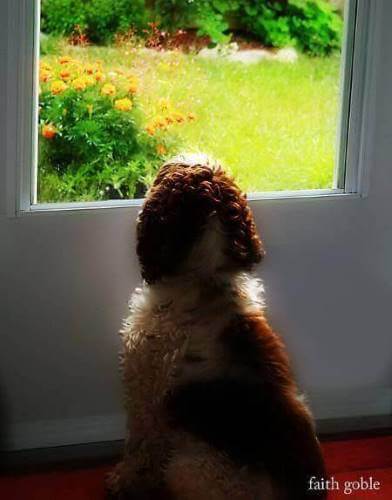 I need to pee Mom!
I need to pee Mom!Many years ago, when dog owners weren't as enlightened as we are now, it was considered acceptable, almost encouraged, to rub your puppy's nose in his mess if he soiled indoors!
It was meant to teach him a lesson, but I can assure you that school of thought never helped with the development of potty training your puppy.
Thank goodness puppy toilet training has moved on since then!
We now know that for our 'disapproval' to be effective, the puppy must be caught 'red-handed'. Unless we do this, he won't understand why we're unhappy with his behaviour.
Instead, he's more likely to become afraid of pooping in front of us, which may lead him to become secretive about it. He may sneak off to do it under the kitchen table or behind the sofa!
Potty Training Your Puppy: Clearing Away Little 'Accidents'
You should expect little accidents while you're potty training your puppy. Don't worry or fuss about it; simply clear it away as soon as possible.
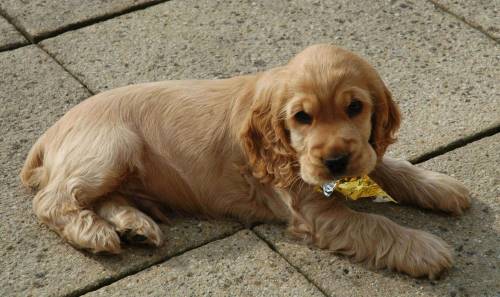 Does this puppy look guilty to you?
Does this puppy look guilty to you?Though your floor may smell and look clean to you, your puppy will still be able to smell the ammonia in his pee.
Any lingering smell of urine will only attract your puppy and encourage him to pee in the same place again.
Use a natural odour eliminator spray or a mixture of biological washing powder and vinegar; both effectively remove any smell.
Never use ammonia-based cleaning products.
As your puppy's pee contains ammonia, the ammonia smell from the cleaning product could encourage your puppy to pee where it has been used.
Puppy Potty Training During The Night
Potty training your puppy doesn't stop just because it's night-time!
If you take him outside just before you go to bed, you've a better chance of your puppy staying dry overnight; however, don't expect too much from your little man at this stage. He's still too young and won't yet have complete control over his bladder or bowels.
Here are a few precautions to take to help your puppy get through the night.
Night-time Options
For night-time, you have a couple of things you can try.
Option 1:
You may not like this idea, but here goes! Set your alarm and get up at 3:00 am to take him outside.
Option 2:
If possible, section off a small part of the room where your puppy sleeps to minimise any 'damage'.
Lay polythene by the door (or in one corner of the room) and top it with old newspaper.
Place a tissue soaked with your puppy's pee in the middle of the newspaper. This will help to encourage your puppy to pee precisely where you want him to!
You could also use puppy training pads laid over the newspaper, but they can be expensive if you're on a budget.
Some owners believe there are better ways to train puppies than newspapers or training pads. They think it teaches puppies that it's okay to pee indoors.
It's believed that this can confuse them and undermines the puppy house training routine.
I think it's simply a personal choice, so do whatever works for you.
Restrict Your Puppy's Water At Night
When I was potty training my puppy, I found that removing his water an hour or two before bedtime helped him stay dry.
There were many mornings when there wasn't a drop on the newspaper!
Just remember to take him outside as soon as he wakes; otherwise, he won't stay dry for long!
Potty Training Your Puppy: On A Leash
Some puppies won't do their toilet when out walking on a leash. Instead, they wait until they get back to their own garden to do it. Or they wait until the minute they're indoors and then pee on your best rug!
Can you relate to this? Frustrating, isn't it?
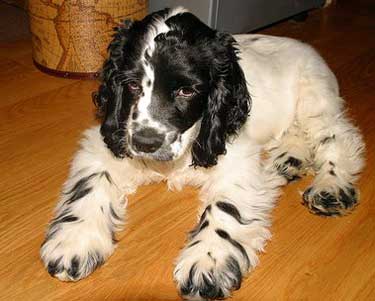 Do you like my zebra-stripped legs?
Do you like my zebra-stripped legs?You probably won't have much of a problem first thing in the morning because your puppy is likely to have slept through the night without peeing; he'll be busting to pee when he wakes.
If your puppy is peeing on the floor before you reach him, set your alarm clock and get up slightly earlier to take him out for a brisk walk. Your Cocker Spaniel is more likely to pee while wearing his collar and lead if he's desperate to pee.
If your puppy still needs to be leash trained, learn how here.
When he pees 'on leash', praise your puppy and reward him with extra treats, and he'll soon get the message!
If your puppy fails to do anything during his walk, take him straight to his 'toilet zone' when you return home. If you don't, you can almost guarantee that he'll relieve himself as soon as you step into the kitchen!
If he still doesn't pee, take him inside, but keep a watchful eye on him.
Take him outside every 15 minutes until he performs!
Continue with this process; getting up early and taking him out on the lead. He'll eventually crack, I promise you!
Potty Training Your Puppy: Summary
I hope this article has helped and that you're well on your way to success!
Remember when toilet training your puppy:
- Establish regular feeding times and stick to them.
- Watch for signs that he's about to pee indoors, and never punish your puppy for any little accidents.
- Set up and stick to a regular routine of taking him outside to his toilet area.
- Encourage your puppy to pee, and praise and reward him each time he 'performs' in the right place.
Potty training your puppy won't take long if you follow the above advice; he should be fully house-trained between 4 and 6 months old.
Don't worry if it takes a little longer. No two puppies are the same; each will develop at its own pace.
Stick to this routine, and you'll find your Cocker Spaniel is fully house-trained in no time at all!
More Relevent Articles
No one said toilet training dogs was going to be a walk in the park!
But did you know that crate training your puppy can help toilet train your puppy sooner? Crating offers so many benefits.
It can also help with potty training because pups instinctively try not to pee or poop in their den.
(This instinct stems from when their mother would lick her puppies dry and 'clean up' to remove any scent that may have attracted predators.
Although this no longer applies in their domestic world, the mother will still clean up her babies).
While your puppy is in his crate, he'll try to hold himself longer than he usually would. But there are no guarantees, and there will always be the occasional 'little accident'.
On the other hand, if your puppy is not crated, he'll do his toilet whenever and wherever he can.
Photo Credits for Potty Training Your Puppy:
1. Jstaley401 at https://www.dreamstime.com/royalty-free-stock-photography-cocker-spaniel-puppy-image20754247
2. Poutnik at https://www.dreamstime.com/stock-photography-english-cocker-spaniel-baby-dog-image8840862
3. Cynoclub at https://www.dreamstime.com/royalty-free-stock-photography-puppy-cocker-spaniel-image22758527
4. Liliya Kulianionak at https://www.dreamstime.com/royalty-free-stock-image-english-cocker-spaniels-puppies-image23082786
5. Faith Goble at Flickr.com at https://www.flickr.com/photos/grafixer/4906972374
6. Copyright of About Cocker Spaniels.com
7. Bigdog3c at Flick.com at https://www.flickr.com/photos/bigdog3c/2169972701
Problems Potty Training Your Puppy
When we're potty training we sometimes come up against problems. Here are one or two that our visitors have raised and discussed.
Problems Potty Training My Puppy
Trouble Potty Training Snickers
By: Jade
New Orleans
I don't know why I'm having problems potty training my cocker spaniel puppy, but I am! Every dog we've ever had we've been able to potty train within a few days or so, but our little Snickers is proving to be not so easy.
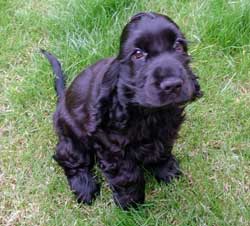 Can I have some privacy please?
Can I have some privacy please?(We bought a 4 month-old cocker spaniel puppy after our blue Dobie sadly passed away. We named our new pup Snickers.)
I was advised to crate train Snickers because he was so wild; he was pooping and peeing everywhere, even though I would take him out every two hours during the day and between every 2 to 3 hours at night.
The crate is wonderful. I don't have to chase him constantly and he's very comfortable in it.
But still I will take him out and he will do his job a good percentage of the time, but no sooner do we get in the house and he does one or the other.
I take him out to the same place and tell him to potty and praise him.
He doesn't get as much exercise as I know he should because it's winter and the temperature is between 0 and 20 degrees!
I have read Ceaser's books and have been researching on this website, but I'm still having trouble potty training Snickers.
I'm trying to teach him to sit and stay, but unfortunately, that's also going nowhere, despite the fact that I'm quite a patient and persistent person.
Do you have any suggestions for me?
He is absolutely not interested in treats when I try to reward him with them outside.
I walk my other dog faithfully, winter or summer. I'm wondering if a coat and some boots would be okay for my little puppy, or if he's still too small for such cold weather?
Any other tips or suggestions will be much appreciated.
Trouble Potty Training Your Puppy?
Our Visitors' Replies
Trouble Potty Training
By: Danny
I take my cocker puppy out every hour; after playing, after any form of exercise or excitement, and as soon as he wakes up.
I would try taking your puppy outside more often - I'm sure you'll see a big difference.
As your puppy grows you'll be able to leave it a little longer between toilet breaks.
I think you're right to keep your puppy crated as it will help to keep him out of mischief.
Hope this helps.
Trouble Potty Training Your Cocker Spaniel
By: Anonymous
I have had Trusty for over two years now and while he goes outside when I take him, he has certain places in the house he goes if he does not see me. And only recently did he start asking to go out.
Long and the short of it: at this point after trying to be consistent and positive as possible for two years, I decided I would have to put a diaper on him to prevent the indoor messes.
If I see him go when he's outside, I praise him and when we go in I let him run where ever. If, however, I don't see him go, or if he doesn't like the weather and refuses to go out, I put a diaper on him.
He hates it!
Now when we are outside he runs right over to me. It's as if he wants to show me he did his business!
He even licks my face even if I am asleep to ask to go out.
He had an accident the other day when I was not minding him, but I would say the diaper worked both in preventing messes and in teaching him what I wanted him to do.
Hope you have success with your puppy very soon.


